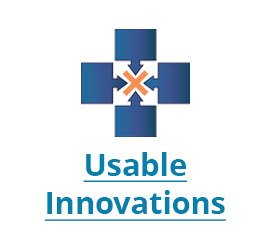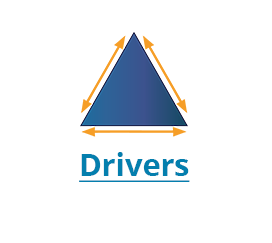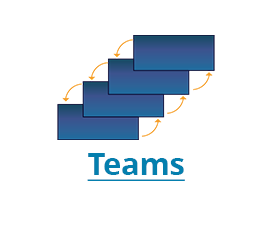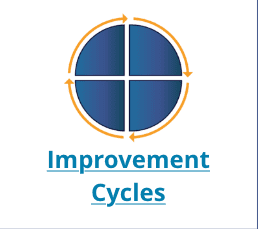Start Here
Active Implementation Learner Pathways
Learning pathways in implementation science serve as structured routes for individuals to effectively acquire the necessary knowledge, skills, and competencies to translate evidence-based interventions into real-world settings.
Activity: Getting started with Implementation Stages
How do you start engaging in stage-based implementation activities? Review the Active Implementation Overview material on Implementation Stages, then consider these questions. We encourage you to discuss these with your team and/or to write down your responses.
Handout: Implementation Stages One-Pager
Implementation Stages outline the integrated, non-linear process of deciding to use an effective innovation and having it fully in place to realize outcomes. Active implementation stages are Exploration, Installation, Initial Implementation and Full Implementation.
Implementation Stages Overview (Module 4)
Formally known as "modules" on the AI Hub, we have condensed the information into document overviews. As you begin your journey, take a moment to read about the Stages of Implementation (exploration, installation, initial implementation, and full implementation).
Tool: Implementation Stages Planning
The Implementation Stages Planning tool supports the identification of the current stage of implementation, as well as supports planning and improvement.
Dive Deeper: Read
Active Implementation Early Childhood Specialist Toolkit
The Active Implementation Early Childhood Specialist Toolkit was developed to help Head Start Early Childhood Specialists conduct implementation-informed process consultation and build Head Start Grantees' capacity. The toolkit contains tools and resources to help grantees use implementation best practices in their work.
Community School Strategy Implementation Roadmap
Community School Strategy Implementation Roadmap
Handout: District Readiness – Examples from Practice
The Greater Louisville Education Cooperative supports Jefferson County Public Schools (JCPS) in developing a critical perspective data report using the district data stored in the Kentucky Data Dashboard. JCPS has 150 schools with more than 101,000 students.
Handout: Implementation Stages One-Pager
Implementation Stages outline the integrated, non-linear process of deciding to use an effective innovation and having it fully in place to realize outcomes. Active implementation stages are Exploration, Installation, Initial Implementation and Full Implementation.
Implementación de prácticas basadas en la evidencia
This guide is a resource that has been developed in Spain, taking as a reference different resources to help broaden the focus of action in the implementation of evidence-based practices, knowing the stages and steps to follow and the necessary elements of the system for a successful implementation of the program.
Implementation Stages Overview (Module 4)
Formally known as "modules" on the AI Hub, we have condensed the information into document overviews. As you begin your journey, take a moment to read about the Stages of Implementation (exploration, installation, initial implementation, and full implementation).
Improved Mathematics Outcomes using Active Implementation: Kentucky’s Effective and Durable Change
Kentucky educators defy the odds with focus, persistence, and a collective commitment to results-driven accountability. This brief presents the results from a quasi-experimental study to evaluate four school districts' efforts to improve mathematics achievement for priority populations.
Preparing for Implementation: Running Your Own Race
SISEP Blog: Preparing for Implementation: Running Your Own Race
Scaling-Up Brief 3: Readiness for Change
The purpose of this Brief is to define the variables a state or district leadership team may wish to consider as they determine if they are ready to invest in the scaling-up of innovation in education.
Scaling-Up Brief 4: Exploration Stage
Exploration Stage processes are designed to assure mutually informed agreement to proceed with use of an innovation; both the Implementation Team and the organization understand what is to be done, how it will be done, and the resources and timelines for doing it.
Why Intentional Planning is Needed for Scaling
SISEP Blog: Why Intentional Planning is Needed for Scaling
Dive Deeper: Watch
Implementation Quick Start
This 5-minute presentation provides a quick overview of Implementation Science and the National Implementation Research Network's Active Implementation Frameworks.
Voices from the Field Video Series (Initial Implementation)
Voices from the Field Video Series: Initial Implementation
Voices from the Field Video Series (Installation Stage)
Voices from the Field Video Series (Installation Stage)
Voices from the Field Video Series (Rationale for Active Implementation)
Voices from the Field Video Series: Rationale for Active Implementation
Voices from the Field Video Series (Sustainability)
Voices from the Field Video Series: Sustainability
Dive Deeper: Listen
Dive Deeper: Reflect
Activity: Exploring with the Initiative Inventory
Before starting something new, reviewing what already exists and how your district uses existing resources is important. This activity can help delineate how much is already being asked of staff and determine if the new will fit the existing.
Activity: Getting started with Implementation Stages
How do you start engaging in stage-based implementation activities? Review the Active Implementation Overview material on Implementation Stages, then consider these questions. We encourage you to discuss these with your team and/or to write down your responses.
Activity: Implementation Stages Elevator Speech
After reviewing the Implementation Stages Overview, create a 3-minute elevator speech for district leadership, a superintendent, or a principal explaining the importance of purposefully moving through the Implementation Stages.
Activity: Using the Implementation Stages Planning Tool
Using the Stages of Implementation Analysis tool, think of a current initiative at your site and consider which components of the Exploration Stage were in place, partially in place or not in place when it was first launched. How about now?
Activity: Which Stage is this effort in?
Review a set of 5 scenarios. For each scenario mark one of the following:
A) Exploration B) Installation C) Initial Implementation D) Full Implementation E) None of these
Activity: Working Agreements (Terms of Reference)
Implementation Teams use Terms of Reference (ToR) or Working Agreements to clarify the team's work, help the team stay on mission and orient new members. You can use this activity with your team to organize and articulate a ToR/Working Agreement.
Apply
Implementation Stages: Action Plan
An action plan is simply a way of guiding the implementation team's discussion and identification of the next right steps in implementing your program, then holding yourselves accountable for accomplishing those activities within a specified timeline.
Lesson: Implementation Stages
Knowledge of the activities and outcomes relevant to each implementation stage will help you construct a successful implementation plan
Lesson: Implementation Stages Planning Tool
This interactive lesson describes the key functions of the Stages of Implementation Analysis planning tool and high level activities related to the stages of implementation
Look Fors: Exploration Meeting
This observation tool captures facilitation skills of implementation team members during exploration meetings.
Tool: Empathy Interview Process & Template
An Implementation Support Practitioner can gain knowledge of the context through an empathy interview as part of the design process in supporting agencies with implementation.
Tool: Implementation Stages Planning
The Implementation Stages Planning tool supports the identification of the current stage of implementation, as well as supports planning and improvement.






